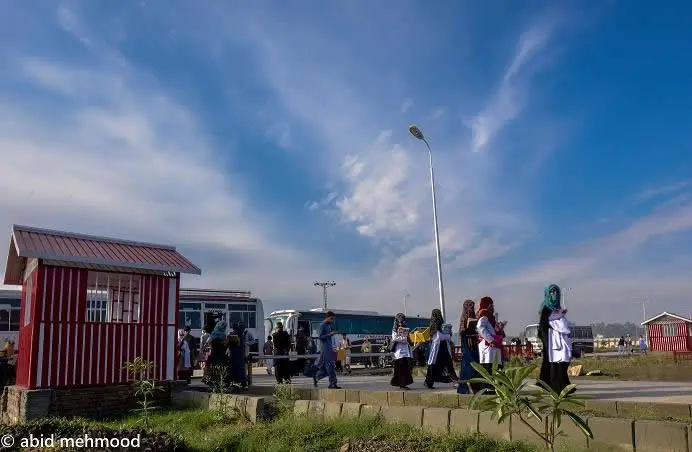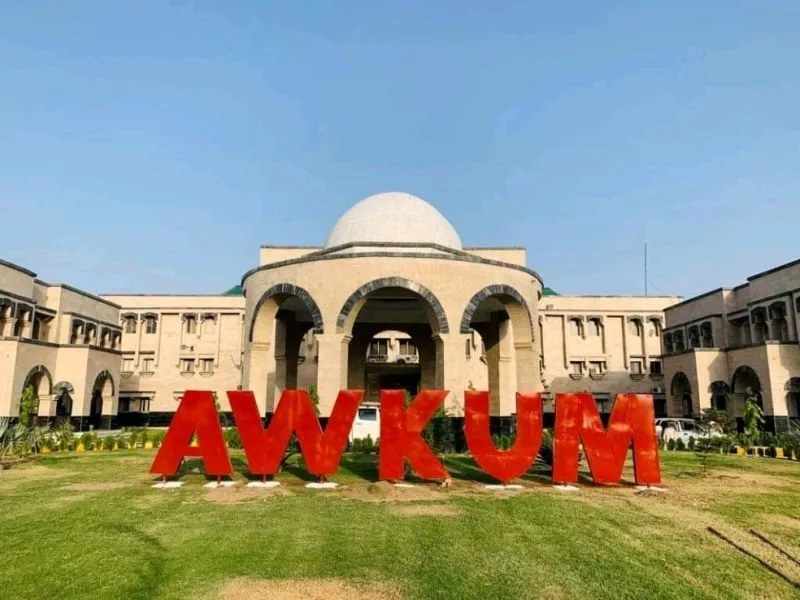Empowering Afghan Women Education; Abdul Wali Khan University Mardan takes a historic leap by granting 50 scholarships to Afghan women, defying barriers and empowering futures. AWKUM’s visionary initiative rekindles education’s flame, transcending borders and instilling hope. A resolute step towards change, echoing globally. #EducationForAll
Breaking Barriers: AWKUM’s 50 Scholarships Extend Education and Hope to Afghan Women
Abdul Wali Khan University in Mardan, Khyber Pakhtunkhwa, has issued scholarships or bursaries in the field programme, empowering Afghan female students’ education. Our obligation is to grant access.

Pic Abid mehmood
Dr. Zahoorul Haq, Vice Chancellor of Abdul Wali Khan University, announced that the decision was made on Friday during the university’s syndicate meeting. Deweh about it. They also announced 50 scholarships for Afghan students.
He said that the university will provide education for these female pupils.
He contends that this is the university’s initiative and that the institution is capable of carrying it out independently because it has its own funding.
According to Dr. Zahoor-ul-Haq, “Afghan female students do not have access to education in their homeland, it is our responsibility to provide access.”
Mr. VC said, “Students from Afghanistan who travel abroad for their studies should visit the Pashtun homeland.”
Wonderful news! AWKUM’s Board of Management made a momentous choice during its seventh meeting. A total of 50 full-semester fee waiver scholarships are now accessible for Afghan women enrolled in associate’s degree and FA/Fsc programmes! Let’s encourage high-quality education while empowering dreams. #EducationForAll “
Abdul Wali Khan University Mardan (@AWKUMofficial), 25 August 2023
When the Taliban took control of Afghanistan in August 2021, the Taliban forbade Afghan students from attending secondary schools, colleges, or universities. This proclamation was given by Abdul Wali Khan University at that time.
The Taliban assert that they are granting women rights according to Islamic law and that, should the circumstances improve, they would establish girls’ schools.
Dr. Shaysta Irshad, the director of finance at Abdul Wali Khan institution, stated that if the university admits Afghan students, they will offer more scholarships for female students next year.
“Students in Afghanistan can enrol online as well,” she said. The university’s website contains the admissions forms.
Three days ago, the Al-Habtoor Group of the United Arab Emirates reported that the Taliban government in Afghanistan had blocked a number of students from traveling to the UAE for study.
The head of the Al-Habtoor organisation, Khalaf Ahmad Al-Habtoor, reportedly branded the Taliban’s move “a deep tragedy” and “a blow to the principles of humanity, education, equality, and justice.”
The Taliban, who now control Afghanistan, have not issued any formal statements.
On August 15, 2021, the Taliban took control of Afghanistan and immediately began to severely limit women’s rights and freedom.
Afghan women and girls are subject to numerous limitations under the Taliban’s control, and they are the target of harsh international condemnation.
The United States, the UN, and several other nations have repeatedly urged the Taliban to eliminate barriers to women’s work and education.
When the Taliban forbade girls from attending universities in December of last year, the United States denounced this action and stated,
“The world cannot officially recognize the Taliban until they demonstrate respect for all rights in Afghanistan; this decision will entail severe consequences for the Taliban.”
The ruling Taliban in Afghanistan decided to forbid Jinki from taking the Kankur test, and the Organisation of Islamic Cooperation [OIC] expressed their unhappiness with this decision in January of this year.
No nation in the world has yet acknowledged the Taliban’s government in Afghanistan.

